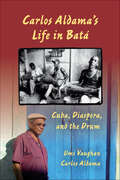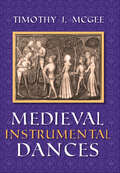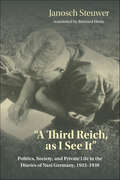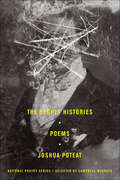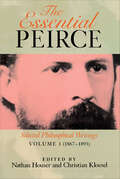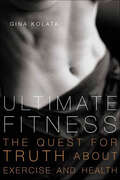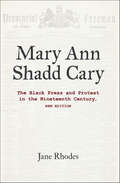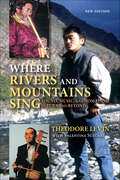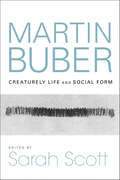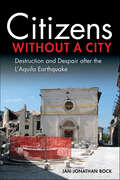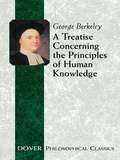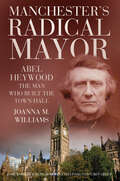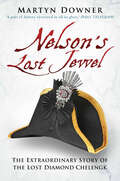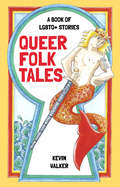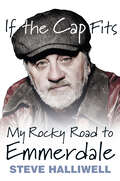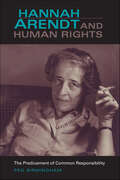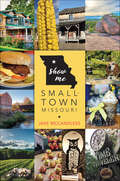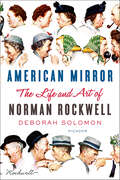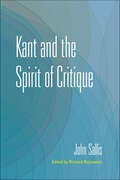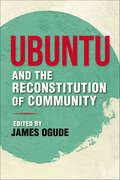- Table View
- List View
Carlos Aldama's Life in Batá: Cuba, Diaspora, and the Drum
by Umi Vaughan Carlos AldamaBatá identifies both the two-headed, hourglass-shaped drum of the Yoruba people and the culture and style of drumming, singing, and dancing associated with it. This book recounts the life story of Carlos Aldama, one of the masters of the batá drum, and through that story traces the history of batá culture as it traveled from Africa to Cuba and then to the United States. For the enslaved Yoruba, batá rhythms helped sustain the religious and cultural practices of a people that had been torn from its roots. Aldama, as guardian of Afro-Cuban music and as a Santería priest, maintains the link with this tradition forged through his mentor Jesus Pérez (Oba Ilu), who was himself the connection to the preserved oral heritage of the older generation. By sharing his stories, Aldama and his student Umi Vaughan bring to light the techniques and principles of batá in all its aspects and document the tensions of maintaining a tradition between generations and worlds, old and new. The book includes rare photographs and access to downloadable audio tracks.
Medieval Instrumental Dances
by Timothy J. McGeeIn Europe the tradition of secular dance has continued unbroken until the present. In the late Middle Ages it was an important and frequent event—for the nobility a gracious way to entertain guests, for the peasantry a welcome relaxation from the toils of the day. Now back in print, this collection presents compositions that are known or suspected to be instrumental dances from before ca. 1420. The 47 pieces vary in length and style and come from French, Italian, English, and Czech sources. Timothy McGee relates medieval dances to the descriptions found in literary, theoretical, and archival sources and to the depictions in the iconography of the Middle Ages. In a section on instrumental performance practices, he provides information about ornamenting the dances and improvising in a historically appropriate style. This comprehensive edition brings together in one volume a repertory that has been scattered over many years and countries.
"A Third Reich, as I See It": Politics, Society, and Private Life in the Diaries of Nazi Germany, 1933–1939
by Janosch SteuwerWith the beginning of the National Socialist dictatorship, Germany not only experienced a deep political turning point but the private life of Germans also changed fundamentally. The Nazi regime had far-reaching ideas about how the individual should think and act.In "A Third Reich, as I See It" Janosch Steuwer examines the private diaries of ordinary Germans written between 1933 and 1939 and shows how average citizens reacted to the challenges of National Socialism. Some felt the urge and desire to adapt to the political circumstances. Others felt compelled to do so. They all contributed to the realization of the vision of a homogeneous, conflict-free, and "racially pure" society.In a detailed manner and with a convincing sense of the bigger picture, Steuwer shows how the tense efforts of people to fit in, and at the same time to preserve existing opinions and self-conceptions, led to a close intertwining of the private and the political."A Third Reich, as I See It" offers a surprisingly new look at how the ideological visions of National Socialism found their way into the everyday reality of Germans.
The Regret Histories: Poems
by Joshua PoteatThis powerful and provocative new installment of poetry is a recipient of the 2014 National Poetry Series Prize, as chosen by Campbell McGrath.The National Poetry Series’s long tradition of promoting exceptional poetry from lesser-known poets delivers another outstanding collection of poetry by Joshua Poteat.Through an investigation of the haunted spaces where history collides with the modern southern American landscape, The Regret Histories explores themes of ruin and nostalgia, our relationship to a collective past, and the extraordinary indifference of time to memory.For thirty years, the National Poetry Series has discovered many new and emerging voices and has been instrumental in launching the careers of poets and writers such as Billy Collins, Mark Doty, Denis Johnson, Marie Howe, and Sherod Santos.
The Essential Peirce, Volume 1: Selected Philosophical Writings (The Essential Peirce)
by Nathan Houser and Christian Kloesel" . . . a first-rate edition, which supersedes all other portable Peirces. . . . all the Peirce most people will ever need." —Louis Menand, The New York Review of Books"The Monist essays are included in the first volume of the compact and welcome Essential Peirce; they are by Peirce's standards quite accessible and splendid in their cosmic scope and assertiveness." —London Review of BooksA convenient two-volume reader's edition makes accessible to students and scholars the most important philosophical papers of the brilliant American thinker Charles Sanders Peirce. This first volume presents twenty-five key texts from the first quarter century of his writing, with a clear introduction and informative headnotes. Volume 2 will highlight the development of Peirce's system of signs and his mature pragmatism.
Chocolates for Breakfast: A Novel
by Pamela Moore“A gem of adolescent disaffection featuring a Holden Caulfield-like heroine.” — Vogue.com“Once I started reading it, I didn’t want to stop. . . . If your all-time favorite books include works of young-adult fiction (like Catcher), I strongly urge you to take a look." — USA Today/Pop CandyA riveting coming-of-age story, Chocolates for Breakfast became an international sensation upon its initial publication in 1956, and still stands out as a shocking and moving account of the way teenagers collide, often disastrously, against love and sex for the first time. This edition includes an introduction by author Emma Straub.Courtney Farrell is a disaffected, sexually precocious fifteen-year-old. She splits her time between Manhattan, where her father works in publishing, and Los Angeles, where her mother is a still-beautiful Hollywood actress. After a boarding-school crush on a female teacher ends badly, Courtney sets out to learn everything fast. Her first drink is a very dry martini, and her first kiss the beginning of a full-blown love affair with an older man.
Enchantment: A Novel
by Daphne MerkinA bold, provocative "pioneering novel" (Los Angeles Times) about family, womanhood, and growing upSet on Manhattan's Upper East Side, Enchantment is narrated by Hannah Lehmann, the wry survivor of a troubled childhood. Hannah's perceptions of her Orthodox German Jewish heritage—her five brothers and sisters, the complicated power of families, the madness of money, the obsessive workings of memory itself—are as disquieting in their sharpness as they are lucid in their irony. The world, she finds, is a treacherous place where love is closely knit with pain, but even the limitations of her own point of view are not lost on Hannah. She is all too aware that her perspective is fixed in the vise of her childhood: “My mother,” she says, “is the source of my unease in the world and thus the only person who can make me feel at home in the world.”This is a novel about what people say when they are talking to themselves; what families look like when they are not observed by others. Provocative, hawkishly observed, and devastating in its reliability, Daphne Merkin's Enchantment is a searing and unforgettable exploration of family and self.
Ultimate Fitness: The Quest for Truth about Exercise and Health
by Gina KolataThe bestselling science reporter for The New York Times tells us what works and what doesn't when we work outUltimate Fitness: The Quest for Truth About Exercise and Health is Gina Kolata's compelling journey into the world of American physical fitness over the past thirty years. It is a funny, eye-opening, brow-sweating investigation into the fads, fictions, and science of fitness training.From the early days of jogging, championed by Jim Fixx— who later died of a heart attack—to weight lifting, cycling, aerobics, and Spinning, Kolata questions such popular notions as the "fat-burning zone" and "spot reducing," the effects of food on performance, how much exercise helps build fitness, and the difference between exercise to help the heart and exercise to change the body. She explains the science of physical fitness and the objective evidence behind commonly accepted prescriptions. Along the way she profiles researchers and mavericks who have challenged conventional wisdom, marketed their inventions, and sometimes bucked criticism only to back down from their original claims.Ultimate Fitness spotlights the machines and machinations of the fitness industry, and cuts through the marketing and hype not only to assess what is healthy, but also to understand what our obsession with staying healthy says about American culture today.
Mary Ann Shadd Cary: The Black Press and Protest in the Nineteenth Century
by Jane RhodesMary Ann Shadd Cary was a courageous and outspoken nineteenth-century African American who used the press and public speaking to fight slavery and oppression in the United States and Canada. Part of the small free black elite who used their education and limited freedoms to fight for the end of slavery and racial oppression, Shadd Cary is best known as the first African American woman to publish and edit a newspaper in North America. But her importance does not stop there. She was an active participant in many of the social and political movements that influenced nineteenth century abolition, black emigration and nationalism, women's rights, and temperance. Mary Ann Shadd Cary: The Black Press and Protest in the Nineteenth Century explores her remarkable life and offers a window on the free black experience, emergent black nationalisms, African American gender ideologies, and the formation of a black public sphere. This new edition contains a new epilogue and new photographs.
Where Rivers and Mountains Sing: Sound, Music, and Nomadism in Tuva and Beyond
by Theodore Levin Valentina SüzükeiTheodore Levin takes readers on a journey through the rich sonic world of inner Asia, where the elemental energies of wind, water, and echo; the ubiquitous presence of birds and animals; and the legendary feats of heroes have inspired a remarkable art and technology of sound-making among nomadic pastoralists. As performers from Tuva and other parts of inner Asia have responded to the growing worldwide popularity of their music, Levin follows them to the West, detailing their efforts to nourish global connections while preserving the power and poignancy of their music traditions.
Martin Buber: Creaturely Life and Social Form (New Jewish Philosophy and Thought)
by Sarah ScottA new collection of essays highlighting the wide range of Buber's thought, career, and activism. Best known for I and Thou, which laid out his distinction between dialogic and monologic relations, Martin Buber (1878–1965) was also an anthologist, translator, and author of some seven hundred books and papers. Martin Buber: Creaturely Life and Social Form, edited by Sarah Scott, is a collection of nine essays that explore his thought and career.Martin Buber: Creaturely Life and Social Form shakes up the legend of Buber by decentering the importance of the I-Thou dialogue in order to highlight Buber as a thinker preoccupied by the image of relationship as a guide to spiritual, social, and political change. The result is a different Buber than has hitherto been portrayed, one that is characterized primarily by aesthetics and politics rather than by epistemology or theology. Martin Buber: Creaturely Life and Social Form will serve as a guide to the entirety of Buber's thinking, career, and activism, placing his work in context and showing both the evolution of his thought and the extent to which he remained driven by a persistent set of concerns.
Citizens without a City: Destruction and Despair after the L'Aquila Earthquake
by Jan-Jonathan BockIn 2009, after seismic tremors struck the Italian mountain town of L'Aquila, survivors were subjected to a "second earthquake"—invasive media attention and a relief effort that left them in a state of suspended citizenship as they were forcibly resettled and had to envision a new future.In Citizens without a City, Jan-Jonathan Bock reveals how a disproportionate government response exacerbated survivors' sense of crisis, divided the local population, and induced new types of political action. Italy's disenfranchising emergency reaction relocated citizens to camps and sites across a ruined townscape, without a plan for restoration or return. Through grassroots politics, arts and culture, commemoration rituals, architectural projects, and legal avenues, local people now sought to shape their hometown's recovery. Bock combines an analysis of the catastrophe's impact with insights into post-disaster civic life, urban heritage, the politics of mourning, and community fragmentation.A fascinating read for anyone interested in urban culture, disaster, and politics, Citizens without a City illustrates how survivors battled to retain a sense of purpose and community after the L'Aquila earthquake.
A Treatise Concerning the Principles of Human Knowledge (Dover Philosophical Classics)
by George BerkeleyIf a tree falls in the forest and no one is present to hear it, does it make a sound? It does not, according to George Berkeley. Originally published in 1710, this landmark of Western philosophy introduced a revolutionary concept: immaterialism, which asserts that to be is to perceive or be perceived. An Irish clergyman who spent his entire philosophical career as a churchman, Berkeley linked his investigations to his religious interests. A Treatise Concerning the Principles of Human Knowledge opens with an assault on Locke’s theory of abstract ideas and proceeds with arguments that sensible qualities exist only when perceived as ideas. Physical objects, he claims, are no more than collections of qualities, and these sensible objects, too, are merely ideas. Berkeley relates his position to the achievements of eighteenth-century science, and proclaims the compatibility of immaterialism with traditional religion.The fullest expression of Berkeley’s doctrine of immaterialism, this classic work influenced British philosophers from David Hume to Bertrand Russell and the other logical positivists. It is essential reading for all students of philosophy.
UnRoman Britain: Exposing the Great Myth of Britannia
by Stuart Laycock Miles RussellWhen we think of Roman Britain we tend to think of a land of togas and richly decorated palaces with Britons happily going about their much improved daily business under the benign gaze of Rome. This image is to a great extent a fiction. In fact, Britons were some of the least enthusiastic members of the Roman Empire. A few adopted roman ways to curry favour with the invaders. A lot never adopted a Roman lifestyle at all and remained unimpressed and riven by deep-seated tribal division. It wasn't until the late third/early fourth century that a small minority of landowners grew fat on the benefits of trade and enjoyed the kind of lifestyle we have been taught to associate with period. Britannia was a far-away province which, whilst useful for some major economic reserves, fast became a costly and troublesome concern for Rome, much like Iraq for the British government today. Huge efforts by the state to control the hearts and minds of the Britons were met with at worst hostile resistance and rebellion, and at best by steadfast indifference. The end of the Roman Empire largely came as 'business as usual' for the vast majority of Britons as they simply hadn't adopted the Roman way of life in the first place.
Manchester's Radical Mayor: Abel Heywood, The Man who Built the Town Hall
by Jeremy Roberts Joanna M. WilliamsKnown in his day as the man who built the Town Hall, Abel Heywood was a leading Manchester publisher who entertained royalty at his home and twice became Mayor of Manchester. Yet before he found success his life was one of poverty and hardship, marked by a prison term in his pursuit of a free press. A campaigner for votes for all and social reform, Heywood attempted to enter Parliament twice, but his working-class origins and radical ideas proved an insurmountable obstacle. As councillor, alderman and mayor, he worked passionately and tirelessly to build the road, railway and tram systems, develop education, improve the provision of hospitals, museums and libraries, better the living conditions of the poor, and make Manchester a great city. Going beyond the experiences of one man, this book explores the wider political, cultural and class context of the Victorian city. It is an honest tale of rags to riches that will appeal to all who wish to discover more about the dramatic history of industrial Manchester and its people.
Nelson's Lost Jewel: The Extraordinary Story of the Lost Diamond Chelengk
by Martyn DownerAdmiral Lord Nelson’s diamond Chelengk is one of the most famous and iconic jewels in British history. Presented to Nelson by the Sultan Selim III of Turkey after the Battle of the Nile in 1798, the jewel had thirteen diamond rays to represent the French ships captured or destroyed at the action. A central diamond star on the jewel was powered by clockwork to rotate in wear. Nelson wore the Chelengk on his hat like a turban jewel, sparking a fashion craze for similar jewels in England. The jewel became his trademark to be endlessly copied in portraits and busts to this day.After Trafalgar, the Chelengk was inherited by Nelson’s family and worn at the Court of Queen Victoria. Sold at auction in 1895 it eventually found its way to the newly opened National Maritime Museum in Greenwich where it was a star exhibit. In 1951 the jewel was stolen in a daring raid by an infamous cat-burglar and lost forever.For the first time, Martyn Downer tells the extraordinary true story of the Chelengk: from its gift to Nelson by the Sultan of Turkey to its tragic post-war theft, charting the jewel’s journey through history and forging sparkling new and intimate portraits of Nelson, of his friends and rivals, and of the woman he loved.
The Little Book of Herefordshire (Little Book Of)
by David VaughanThe Little Book of Herefordshire is a compendium full of information which will make you say, ‘I never knew that!’ Contained within is a plethora of entertaining facts about Herefordshire’s famous and occasionally infamous men and women, its literary, artistic and sporting achievements, customs ancient and modern, transport, battles and ghostly appearances. A reliable reference book and a quirky guide, this can be dipped in to time and time again to reveal something new about the people, the heritage, the secrets and the enduring fascination of the county. A remarkably engaging little book, this is essential reading for visitors and locals alike.
Queer Folk Tales: A Book of LGBTQ Stories
by Kevin WalkerThe prince no longer kisses the princess, Cinderella helps her new husband to pick a new dress and the relationship between Mr Wolf and the three little pigs is a bit more complicated than you might have thought. In this collection of delightful, empowering and often magical tales, Kevin Walker creates and adapts a host of stories for the LGBTQ+ community. These sometimes traditional and sometimes modern tales show queer people that they belong not only in today’s world, but also in a storytelling tradition going back centuries, if not millennia. This is a wonderful collection for LGBTQ+ readers of all ages to enjoy and continue to tell for years to come, introducing characters who are romantic, brave, mysterious or fantastical – but always authentic.
If the Cap Fits: My Rocky Road to Emmerdale
by Steve HalliwellSteve Halliwell is best known as the loveable patriarch Zak Dingle in the hit TV show Emmerdale, a part he has played since 1994 and which has led him to become one of the UK’s most recognisable and treasured soap stars. Yet before he found success on the Yorkshire Dales, Halliwell spent many years desperately seeking work, often spending time on the streets in the search of food. This warts-and-all story of Halliwell’s rise to fame, where success was only won after great personal struggles, is inspirational to those who wish to establish a life and career for themselves in the face of similar hardships. Going beyond the experiences of one man, If the Cap Fits explores a wider social, cultural and class history that permeated the country in the sixties and seventies, and still lingers today. Above all else, this is an honest tale of rejection and redemption throughout a fascinating and colourful life that will appeal to all who have the ambition to better themselves.
Derbyshire Murders (Sutton True Crime History)
by Martin BaggoleyDerbyshire Murders brings together fifteen of the county's most extraordinary and shocking cases. The crimes covered made not just local but in some cases national headlines. For this fascinating, illustrated collection, Martin Baggoley has returned to original sources - including police interviews, trial transcripts and contemporary newspaper reports - to rebuild each story from scratch. Cases include a murder and robbery committed in 1842 in Stanley, and the murder of a police constable in Derby in 1879. Although the killer was sentenced to death, he was reprieved after it was revealed how the jury had reached their decision: they drew lots and tossed a coin. Also included are cases from Belper, Chesterfield, Bonsall, Glossop and Ilkeston. This unique re-examination of the darker side of Derbyshire's past is sure to appeal to all those interested in the shady side of the county's history.
Hannah Arendt and Human Rights: The Predicament of Common Responsibility (Studies in Continental Thought)
by Peg BirminghamHannah Arendt's most important contribution to political thought may be her well-known and often-cited notion of the "right to have rights." In this incisive and wide-ranging book, Peg Birmingham explores the theoretical and social foundations of Arendt's philosophy on human rights. Devoting special consideration to questions and issues surrounding Arendt's ideas of common humanity, human responsibility, and natality, Birmingham formulates a more complex view of how these basic concepts support Arendt's theory of human rights. Birmingham considers Arendt's key philosophical works along with her literary writings, especially those on Walter Benjamin and Franz Kafka, to reveal the extent of Arendt's commitment to humanity even as violence, horror, and pessimism overtook Europe during World War II and its aftermath. This current and lively book makes a significant contribution to philosophy, political science, and European intellectual history.
Show Me Small-Town Missouri
by Jake McCandlessWhere was Mark Twain born? What city has claim to a president who was only president for a day? Who has the best paddling trips in the Ozarks? What about the World's Largest Gift Store? Find these answers and more in Show Me Small-Town Missouri. Award-winning author Jake McCandless, a lover of small towns and adventures, traveled the state in search of amazing local experiences to share this treasure trove of what you can find in often-overlooked towns across Missouri. Featured are 90 sparkling gems found in all four of the state's geographical regions—the Northern Prairie, the Southwest Osage Plain, the Ozarks, and the Bootheel Lowlands. The must-see attractions, activities, restaurants, sweet shops, specialty shops, and unique vacation spots are showcased in full-color images with an easy-to-follow index to help you plan your trip.From galleries to hiking trails, candy factories to wineries, lakeside attractions to the best fireworks displays, Show Me Small-Town Missouri has everything you need to know for a day, weekend, or week full of fun.
American Mirror: The Life and Art of Norman Rockwell
by Deborah SolomonA NEW YORK TIMES BOOK REVIEW NOTABLE BOOK OF THE YEAR A FINALIST FOR THE LOS ANGELES TIMES BOOK PRIZE IN BIOGRAPHY AND SHORTLISTED FOR THE PEN/JACQUELINE BOGRAD WELD AWARD FOR BIOGRAPHY"Welcome to Rockwell Land," writes Deborah Solomon in the introduction to this spirited and authoritative biography of the painter who provided twentieth-century America with a defining image of itself. As the star illustrator of The Saturday Evening Post for nearly half a century, Norman Rockwell mingled fact and fiction in paintings that reflected the we-the-people, communitarian ideals of American democracy. Freckled Boy Scouts and their mutts, sprightly grandmothers, a young man standing up to speak at a town hall meeting, a little black girl named Ruby Bridges walking into an all-white school—here was an America whose citizens seemed to believe in equality and gladness for all.Who was this man who served as our unofficial "artist in chief" and bolstered our country's national identity? Behind the folksy, pipe-smoking façade lay a surprisingly complex figure—a lonely painter who suffered from depression and was consumed by a sense of inadequacy. He wound up in treatment with the celebrated psychoanalyst Erik Erikson. In fact, Rockwell moved to Stockbridge, Massachusetts so that he and his wife could be near Austen Riggs, a leading psychiatric hospital. "What's interesting is how Rockwell's personal desire for inclusion and normalcy spoke to the national desire for inclusion and normalcy," writes Solomon. "His work mirrors his own temperament—his sense of humor, his fear of depths—and struck Americans as a truer version of themselves than the sallow, solemn, hard-bitten Puritans they knew from eighteenth-century portraits."Deborah Solomon, a biographer and art critic, draws on a wealth of unpublished letters and documents to explore the relationship between Rockwell's despairing personality and his genius for reflecting America's brightest hopes. "The thrill of his work," she writes, "is that he was able to use a commercial form [that of magazine illustration] to thrash out his private obsessions." In American Mirror, Solomon trains her perceptive eye not only on Rockwell and his art but on the development of visual journalism as it evolved from illustration in the 1920s to photography in the 1930s to television in the 1950s. She offers vivid cameos of the many famous Americans whom Rockwell counted as friends, including President Dwight Eisenhower, the folk artist Grandma Moses, the rock musician Al Kooper, and the generation of now-forgotten painters who ushered in the Golden Age of illustration, especially J. C. Leyendecker, the reclusive legend who created the Arrow Collar Man.Although derided by critics in his lifetime as a mere illustrator whose work could not compete with that of the Abstract Expressionists and other modern art movements, Rockwell has since attracted a passionate following in the art world. His faith in the power of storytelling puts his work in sync with the current art scene. American Mirror brilliantly explains why he deserves to be remembered as an American master of the first rank.
Kant and the Spirit of Critique (The Collected Writings of John Sallis)
by John SallisThis volume of the Collected Writings of John Sallis presents his lecture courses on Kant. Each course was devoted respectively to one of Kant's three Critiques, and so the book as a whole treats the entirety of the Kantian critical project. Sallis displays here, as he does in all his lecture courses, an uncanny ability to open up dense philosophical texts. The matters Kant deals with—in theoretical, practical, and aesthetic philosophy—are difficult in themselves, and Kant's writings might at times seem so convoluted as to magnify the difficulty. Sallis patiently and successfully lays out the issues and the critical approach to them, such that the reader is led step by step into the very core of Kant's spirit of critique. This volume makes Kant accessible to students, while the most advanced scholars will also profit from it.
Ubuntu and the Reconstitution of Community (World Philosophies)
by Edited by James OgudeUbuntu is premised on the ethical belief that an individual's humanity is fostered in a network of human relationships: I am because you are; we are because you are. The essays in this lively volume elevate the debate about ubuntu beyond the buzzword it has become, especially within South African religious and political contexts. The seasoned scholars and younger voices gathered here grapple with a range of challenges that ubuntu puts forward. They break down its history and analyze its intellectual surroundings in African philosophical traditions, European modernism, religious contexts, and human rights discourses. The discussion embraces questions about what it means to be human and to be a part of a community, giving attention to moments of loss and fragmentation in postcolonial modernity, to come to a more meaningful definition of belonging in a globalizing world. Taken together, these essays offer a rich understanding of ubuntu in all of its complexity and reflect on a value system rooted in the everyday practices of ordinary people in their daily encounters with churches, schools, and other social institutions.
